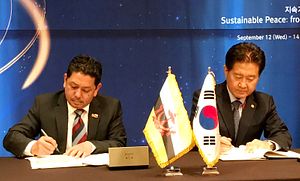Last week, officials from Brunei and South Korea inked a new defense pact. The move put the focus on the ongoing efforts by both sides to boost the security aspect of the bilateral relationship amid wider domestic and regional changes.
Brunei and South Korea have a diplomatic relationship that dates back to the Southeast Asian country’s independence back in 1984. Though the relationship has been multifaceted in terms of its general evolution, the security aspect has traditionally lagged the economic and people-to-people domains. Interactions have included bilateral components, including exchanges as well as the visits of South Korean naval vessels, as well as multilateral ones such as joint interactions in exercises through institutions led by the Association of Southeast Asian Nations (ASEAN).
Both sides have continued to look for opportunities to boost ties, and that has continued on into 2018 as well. Brunei has assumed its role as country coordinator for the ongoing ASEAN-ROK Dialogue relations out to 2021, and the relationship has seen gains in some aspects, whether it be the boost in direct flights or specific infrastructure projects that have furthered Seoul’s role as one of the Southeast Asian state’s top economic partners.
Last week, defense officials from both sides met in yet another interaction between them this year. The bilateral interactions came amid broader regional meetings that bring Bruneian officials to South Korea, including the annual Seoul Defense Dialogue (SDD) forum hosted by the South Korean defense ministry as well as the latest round of ROK-ASEAN Defense Vice-Ministerial Talks.
The main outcome of the bilateral interactions was the inking of a memorandum of understanding (MOU) on defense cooperation between the two sides. The agreement was signed on the sidelines of the Seoul Defense Dialogue (SDD) by the two sides represented by Suk Choo-Suk, South Korea’s vice minister of national defense, and Abdul Rahman, the permanent secretary at Brunei’s defense ministry.
Unsurprisingly, no further specifics were publicly issued by both sides about the details of the agreement, beyond the fact that it covered a range of areas within defense collaboration. MINDEF said only that the inking of the new MOU constituted a step that “affirmed the longstanding defense relations” between the two countries.
Nonetheless, the signing of the MOU was not without significance. For Brunei, this represents just one aspect of its ongoing efforts to strengthen ties with regional powers, of which South Korea is one. And for South Korea, this is yet another indicator of its efforts to deepen relations with Southeast Asian countries and ASEAN as a whole as part of its New Southern Policy under President Moon Jae-in.

































